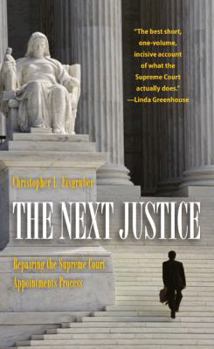The Next Justice: Repairing the Supreme Court Appointments Process
Select Format
Select Condition 
Book Overview
The Supreme Court appointments process is broken, and the timing couldn't be worse--for liberals or conservatives. The Court is just one more solid conservative justice away from an ideological sea change--a hard-right turn on an array of issues that affect every American, from abortion to environmental protection. But neither those who look at this prospect with pleasure nor those who view it with horror will be able to make informed judgments...
Format:Paperback
Language:English
ISBN:0691143528
ISBN13:9780691143521
Release Date:June 2009
Publisher:Princeton University Press
Length:256 Pages
Weight:0.80 lbs.
Dimensions:0.7" x 5.7" x 8.9"
Customer Reviews
2 ratings
Justices cannot avoid controversial choices simply by adhering to the law
Published by Thriftbooks.com User , 15 years ago
"The Next Justice" is on the ROROTOKO list of cutting-edge intellectual nonfiction. Professor Eisgruber's book interview ran here as cover feature on July 22, 2009.
Solid and Fair Analysis of the Process
Published by Thriftbooks.com User , 16 years ago
The appointment process for nominees to the United States Supreme Court is broken, asserts Christopher Eisgruber, and it needs to be fixed. Considering the power wielded by the nine justices, this is not an assertion with which many would argue. The nomination process has long been contentious but, particularly since the Bork hearings, it has become a colossal waste of time. Recent hearings have been an exercise in stonewalling that tell senators and the American people next to nothing. The issue becomes, then, how to fix it. This is where the going gets trickier. But Mr. Eisgruber is careful in the development of his theme. He starts by pointing out that it is impossible to get politics out of the process and that people who assert the opposite are being disingenuous. The Constitution has too many abstract ideas and too much vague language for a person to be neutral in interpreting it. Even parsing out the implications of what seems to be very clear language requires judgement that is a reflection of a person's beliefs. He points out that "judicial restraint," "strict construction," and "originalism" are all terms reflecting ideological slant (that can work both ways) and that "deference to elected officials," while possible, is rarely achieved even by those who claim to follow it (which almost no one does anymore). Mr. Eisgruber then gives us some background on how the Court works, as an insider who clerked there. He takes us through some history, and the impact of certain court decisions. He points our that even Supreme Court justices can't do anything they want, bound as they are by certain procedures and requirements. However, knowing their judicial philosophy offers the most insight into the type of justice a person will be. Judicial philosophy is the key for Mr. Eisgruber. He points out that every president since Eisenhower has vetted their nominees carefully and new fully well the type of justice they were putting on the court. That, unlike what some people think, there have really been no "surprises." Senators have done less well in determining what the judicial philosophy would be and Mr. Eisgruber has a number of suggestions and lines of questioning that might help senators ferret out this information for the American people. If the hearings could do that, he thinks, then the process would do what it is supposed to do. He is realistic, however. He seems to understand that even his suggestions won't work without a government committed to trying to do things better, something that doesn't necessary seem to be on the horizon. He also is a realist in that it is clear that certain arrangements will make certain things happen whether we like it or not. (i.e. A conservative president with a conservative majority in the Senate will get conservative justices through and vice-versa. Moderate justices are the result of presidents and Senates with different ideological slants.) But he is optimistic about what could be done





